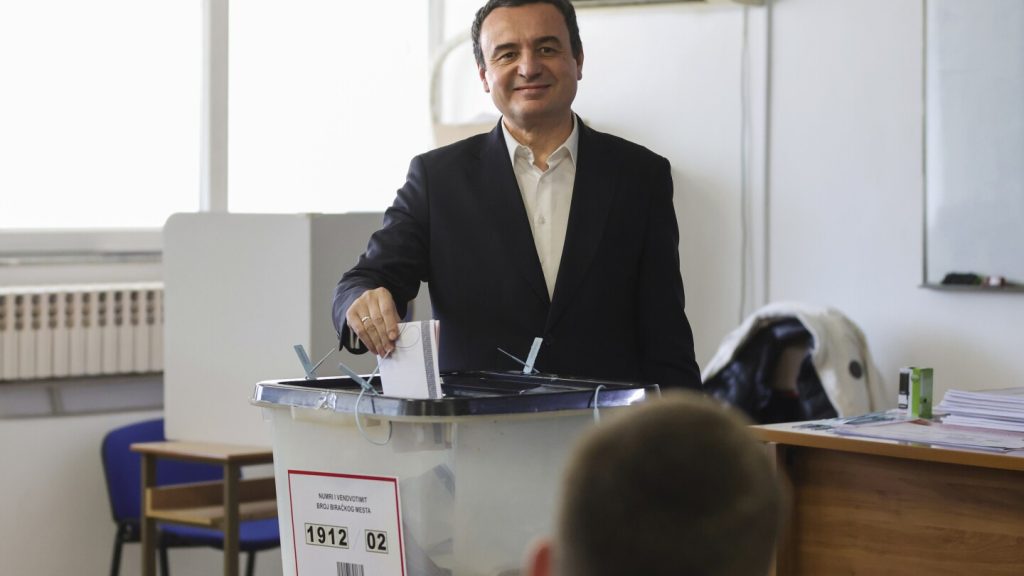Kosovo’s Parliamentary Election: A New Chapter Amidst Old Challenges
Kosovo’s parliamentary election, held on Sunday, marked a significant milestone in the country’s political landscape. According to preliminary results, Prime Minister Albin Kurti’s leftist Self-Determination Movement Party, or Vetevendosje!, emerged as the leading force, securing 41.99% of the votes. However, this margin fell short of the majority needed to govern alone, leaving the door open for potential coalition-building with other parties. The election took place against a backdrop of strained relations with neighboring Serbia, stalled normalization talks, and growing concerns over foreign funding for one of Europe’s poorest nations.
A Fragmented Political Landscape
The election highlighted Kosovo’s fragmented political landscape, with four major parties contending for power. Vetevendosje! led the race, trailed by the Democratic Party of Kosovo (PDK) with 22.68% and the Democratic League of Kosovo (LDK) with 17.9%. The Alliance for Kosovo’s Future, led by former Prime Minister Ramush Haradinaj, secured 7.56%. The PDK, once a dominant force, faces significant challenges as its leaders are detained at The Hague on war crimes charges. Meanwhile, the LDK, the oldest party in Kosovo, continues to struggle after losing much of its influence following the death of its charismatic leader, Ibrahim Rugova, in 2006.
Challenges in Governance and Foreign Relations
Prime Minister Albin Kurti’s victory speech emphasized the people’s triumph,with Vetevendosje! poised to form the next government. However, the party’s ability to govern effectively remains uncertain, given its failure to secure a majority. Kurti’s administration has faced criticism from Western powers for actions perceived as provocative, particularly the ban on the use of Serbian currency and restrictions on dinar transfers from Serbia to Kosovo’s ethnic Serb minority. These moves have heightened tensions with Serbia and raised concerns among international actors, including the U.S., the EU, and NATO, which have urged restraint to avoid inter-ethnic conflict.
Domestic Priorities and Economic Struggles
The election campaign focused on pressing domestic issues, with all major parties pledging to increase public salaries and pensions, improve education and healthcare, and address widespread poverty. However, these promises were often made without clear plans for implementation or funding sources. Kosovo, with a GDP of less than 6,000 euros per capita, remains heavily reliant on foreign aid, which is now under threat. The EU has suspended funding for certain projects, conditioning its resumption on de-escalation efforts in northern Kosovo, where the Serb minority is concentrated. Additionally, the U.S. has imposed a 90-day freeze on funding through the U.S. Agency for International Development, further complicating Kosovo’s economic outlook.
The Role of International Observers and Minority Representation
The election was monitored by a team of 100 EU observers, 18 from the Council of Europe, and approximately 1,600 others from international and local organizations. Despite the high level of international scrutiny, the electoral process was largely peaceful, with only sporadic incidents reported. Kosovo’s parliament reserves 20 seats for minority communities, with 10 allocated specifically for the Serb minority. However, tensions between ethnic Albanians and Serbs persist, particularly in the north, where many Serbs remain skeptical of Kosovo’s independence and aligned with Belgrade. The election also saw low turnout among Kosovo’s diaspora, with only 20,000 of nearly 100,000 eligible voters abroad casting ballots.
The Road Ahead: Negotiations with Serbia and Internal Reforms
The outcome of the election sets the stage for a challenging period ahead, as Kosovo seeks to navigate negotiations with Serbia and address its internal economic and social challenges. Kurti’s government will need to balance domestic priorities with international expectations, particularly regarding the normalization of relations with Serbia. While the EU and the U.S. have called for dialogue, progress remains elusive, with both sides dug in over issues of sovereignty and territorial integrity. For Kosovo’s citizens, the election represents both an opportunity for change and a reminder of the enduring obstacles to stability and prosperity. As Mileva Kovacevic, a Serb resident in northern Mitrovica, aptly stated, “We have to come out and vote. That is our duty.”












